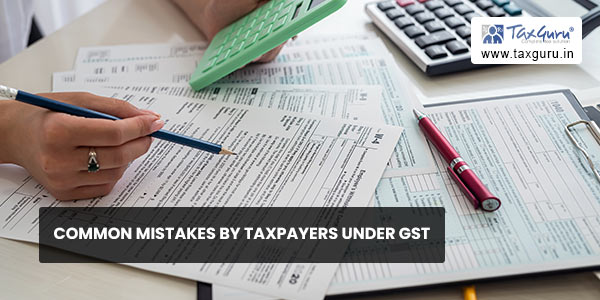“To err is human”. But it is not so in the case of errors/Mistakes in GST. In this Article we are going to see few common mistakes committed by tax payers in GST. These mistakes are general and can be beneficial if avoided.
1. Not Completing Aadhaar Authentication
With Effect from 1st January 2022, Rule 10B has been notified to provide that, Aadhaar authentication for registered person is mandatory for the purpose of
- Filing of Application for revocation of cancellation of registration.
- Filing of Refund Application in Form RFD-01
- Refund Under rule 96 of the IGST Paid on Goods Exported out of India.
Not completing Aadhaar authentication can lead to problems in case of Taxpayers, whose registration has been cancelled and wants to apply for revocation and finds that there is mismatch of information between as mentioned in Aadhaar and GST database. Hence, it is recommended to complete Aadhaar Authentication Immediately for all Taxpayers.
2. Not-Following Rule 86B
Rule 86B “Restriction on use of amount in Electronic Cash Ledger” has come into force from 1st January 2021.Rule 86B states that the registered person shall not use the amount available in Electronic Credit ledger to discharge his liability towards output tax in excess of Ninety-Nine percent of such tax liability, in cases where the value of taxable supply other than exempt supply and Zero-Rated Supply, in a month exceeds fifty-Lakh Rupees.
Provided that the said restriction shall not apply where –
(a) the said person or the proprietor or karta or the managing director or any of its two partners, whole-time Directors, Members of Managing Committee of Associations or Board of Trustees, as the case may be, have paid more than one lakh rupees as income tax under the Income-tax Act, 1961(43 of 1961) in each of the last two financial years for which the time limit to file return of income under subsection (1) of section 139 of the said Act has expired; or
(b) the registered person has received a refund amount of more than one lakh rupees in the preceding financial year on account of unutilised input tax credit under clause (i) of first proviso of sub-section (3) of section 54; or
(c) the registered person has received a refund amount of more than one lakh rupees in the preceding financial year on account of unutilised input tax credit under clause (ii) of first proviso of sub-section (3) of section 54; or
(d) the registered person has discharged his liability towards output tax through the electronic cash ledger for an amount which is in excess of 1% of the total output tax liability, applied cumulatively, upto the said month in the current financial year; or
(e) the registered person is –
(i) Government Department; or
(ii) a Public Sector Undertaking; or
(iii) a local authority; or
(iv) a statutory body:
Recently many Taxpayers have received Notices from department for Non-Compliance of Rule 86B. Hence, it is advised to check whether the Taxpayers whose monthly Taxable value of supply exceeds Rs. Fifty Lakhs have complied with Rule 86B.
3. TDS and TCS Credit Not claimed by Taxpayers
It seems that there is lack of knowledge and clarity among Taxpayers about TDS/TCS Provisions under GST. Under GST Act, TDS is required to be deducted by Central and State governments, Local Authority, Governmental Agencies and notified persons at the rate of 1% on where the total value of supply under a contract exceeds Rupees Two lakhs and Fifty Thousand as per invoice exclusive of GST. Such TDS is required to be deposited to the credit of government and can be claimed by the recipient. The TDS shall reflect in Electronic Cash ledger of the assessee , which can be used to pay the GST Liability Including RCM liability.

Under GST Act, “Every E-Commerce Operator, not being an agent shall collect an amount equal calculated at one percent on the net value of taxable supplies made through it by other supplies where the consideration with respect to such supplies is to be collected by the operator”. Such TCS is required to be deposited to the credit of government and can be claimed by the recipient. The TCS Amount shall reflect in Electronic Cash ledger of the assessee , which can be used to pay the GST Liability Including RCM liability.
In few cases, the Tax Payers assume the TDS/TCS to be TDS/TCS as per Income Tax and Account for the same accordingly. The TDS/TCS are not claimed by them and is a direct loss to them.






Thank you for sharing! It will be useful for many, specially newbies, I appreciate the way it has been articulated. Will be waiting to see many more of such tax related information.